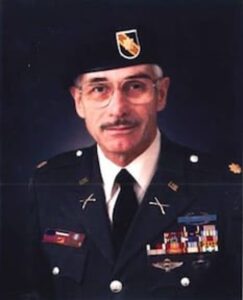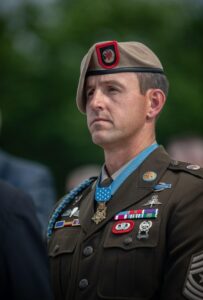Every year at the end of May, people across the U.S. come together to honor and remember those who have given the ultimate sacrifice for our freedom. On this day, service men and women everywhere appreciate being thanked for their service but recognize that Memorial Day is a day of remembrance for the military personnel who gave their lives for American freedoms. More than anything, they want their fallen comrades to be remembered and honored.
Since 1775, over one million men and women have died defending the U.S. Since the Civil War, days of remembrance for fallen soldiers have been celebrated across the country and in 1968, the federal government officially designated the last Monday in May to be observed as a national Memorial Day. As you observe Memorial Day in towns across America this year, the National Medal of Honor Museum encourages everyone to remember our country’s fallen heroes, and to remember the courage and commitment to service above self that led them to such sacrifices.
These same ideals are exemplified in the heroes who have received the Medal of Honor: the patriotism for our country, the courage to go to war, and the selflessness to risk all for a greater purpose.
Only 3,500 members of the U.S. armed forces have received the Medal of Honor since the Civil War and hundreds have been awarded posthumously. Below are just a few of our country’s heroes who have been recognized for their extraordinary valor and their final sacrifice.

Iraq War – Corporal Jason L. Dunham
Corporal Dunham’s squad was conducting a reconnaissance mission in the town of Karabilah, Iraq, when they heard rocket-propelled grenade and small arms fire erupt approximately two kilometers to the west. Corporal Dunham led his Combined Anti-Armor Team towards the engagement to provide fire support to their Battalion Commander’s convoy, which had been ambushed as it was traveling to Camp Husaybah. As Corporal Dunham and his Marines advanced, they quickly began to receive enemy fire. Corporal Dunham ordered his squad to dismount their vehicles and led one of his fire teams on foot several blocks south of the ambushed convoy. Discovering seven Iraqi vehicles in a column attempting to depart, Corporal Dunham and his team stopped the vehicles to search them for weapons. As they approached the vehicles, an insurgent leaped out and attacked Corporal Dunham. Corporal Dunham wrestled the insurgent to the ground and in the ensuing struggle saw the insurgent release a grenade. Corporal Dunham immediately alerted his fellow Marines to the threat. Aware of the imminent danger and without hesitation, Corporal Dunham covered the grenade with his helmet and body, bearing the brunt of the explosion and shielding his Marines from the blast. In an ultimate and selfless act of bravery in which he was mortally wounded, he saved the lives of at least two fellow Marines. By his undaunted courage, intrepid fighting spirit, and unwavering devotion to duty, Corporal Dunham gallantly gave his life for his country, thereby reflecting great credit upon himself and upholding the highest traditions of the Marine Corps and the United States Naval Service.
Afghanistan War – Staff Sergeant Robert J. Miller
While conducting a combat reconnaissance patrol through the Gowardesh Valley, Staff Sergeant Miller and his small element of U.S. and Afghan National Army soldiers engaged a force of 15 to 20 insurgents occupying prepared fighting positions. Staff Sergeant Miller initiated the assault by engaging the enemy positions with his vehicle’s turret-mounted Mark-19 40-millimeter automatic grenade launcher while simultaneously providing detailed descriptions of the enemy positions to his command, enabling effective, accurate close air support. Following the engagement, Staff Sergeant Miller led a small squad forward to conduct a battle damage assessment. As the group neared the small, steep, narrow valley that the enemy had inhabited, a large, well-coordinated insurgent force-initiated a near ambush, assaulting from elevated positions with ample cover. Exposed and with little available cover, the patrol was totally vulnerable to enemy rocket propelled grenades and automatic weapon fire. As point man, Staff Sergeant Miller was at the front of the patrol, cut off from supporting elements, and less than 20 meters from enemy forces. Nonetheless, with total disregard for his own safety, he called for his men to quickly move back to covered positions as he charged the enemy over exposed ground and under overwhelming enemy fire in order to provide protective fire for his team. While maneuvering to engage the enemy, Staff Sergeant Miller was shot in his upper torso. Ignoring the wound, he continued to push the fight, moving to draw fire from over one hundred enemy fighters upon himself. He then again charged forward through an open area in order to allow his teammates to safely reach cover. After killing at least 10 insurgents, wounding dozens more, and repeatedly exposing himself to withering enemy fire while moving from position to position, Staff Sergeant Miller was mortally wounded by enemy fire. His extraordinary valor ultimately saved the lives of seven members of his own team and 15 Afghanistan National Army soldiers. Staff Sergeant Miller’s heroism and selflessness above and beyond the call of duty, and at the cost of his own life, are in keeping with the highest traditions of military service and reflect great credit upon himself and the United States Army.

Vietnam War – Daniel D. Bruce
Early in the morning Pfc. Bruce was on watch in his night defensive position at fire support base tomahawk when he heard movements ahead of him. An enemy explosive charge was thrown toward his position and he reacted instantly, catching the device and shouting to alert his companions. Realizing the danger to the adjacent position with its 2 occupants, Pfc. Bruce held the device to his body and attempted to carry it from the vicinity of the entrenched marines. As he moved away, the charge detonated, and he absorbed the full force of the explosion. Pfc. Bruce’s indomitable courage, inspiring valor and selfless devotion to duty saved the lives of 3 of his fellow marines and upheld the highest traditions of the Marine Corps and the U.S. Naval Service. He gallantly gave his life for his country
Korean War – Edward Clyde Benfold
When his company was subjected to heavy artillery and mortar barrages, followed by a determined assault during the hours of darkness by an enemy force estimated at battalion strength, HC3c. Benfold resolutely moved from position to position in the face of intense hostile fire, treating the wounded and lending words ofencouragement. Leaving the protection of his sheltered position to treat the wounded when the platoon area in which he was working was attacked from both the front and rear, he moved forward to an exposed ridge line where he observed 2 marines in a large crater. As he approached the 2 men to determine their condition, an enemy soldier threw 2 grenades into the crater while 2 other enemy charged the position. Picking up a grenade in each hand, HC3c Benfold leaped out of the crater and hurled himself against the on-rushing hostile soldiers, pushing the grenades against their chests and killing both the attackers. Mortally wounded while carrying out this heroic act, HC3c. Benfold, by his great personal valor and resolute spirit of self-sacrifice in the face of almost certain death, was directly responsible for saving the lives of his 2 comrades. His exceptional courage reflects the highest credit upon himself and enhances the finest traditions of the U.S. Naval Service. He gallantly gave his life for others.

World War II – Alexander Bonnyman, Jr.
Acting on his own initiative when assault troops were pinned down at the far end of Betio Pier by the overwhelming fire of Japanese shore batteries, 1st Lt. Bonnyman repeatedly defied the blasting fury of the enemy bombardment to organize and lead the besieged men over the long, open pier to the beach and then, voluntarily obtaining flame throwers and demolitions, organized his pioneer shore party into assault demolitionists and directed the blowing of several hostile installations before the close of D-day. Determined to effect an opening in the enemy’s strongly organized defense line the following day, he voluntarily crawled approximately 40 yards forward of our lines and placed demolitions in the entrance of a large Japanese emplacement as the initial move in his planned attack against the heavily garrisoned, bombproof installation which was stubbornly resisting despite the destruction early in the action of a large number of Japanese who had been inflicting heavy casualties on our forces and holding up our advance. Withdrawing only to replenish his ammunition, he led his men in a renewed assault, fearlessly exposing himself to the merciless slash of hostile fire as he stormed the formidable bastion, directed the placement of demolition charges in both entrances and seized the top of the bombproof position, flushing more than 100 of the enemy who were instantly cut down, and effecting the annihilation of approximately 150 troops inside the emplacement. Assailed by additional Japanese after he had gained his objective, he made a heroic stand on the edge of the structure, defending his strategic position with indomitable determination in the face of the desperate charge and killing 3 of the enemy before he fell, mortally wounded. By his dauntless fighting spirit, unrelenting aggressiveness and forceful leadership throughout 3 days of unremitting, violent battle, 1st Lt. Bonnyman had inspired his men to heroic effort, enabling them to beat off the counterattack and break the back of hostile resistance in that sector for an immediate gain of 400 yards with no further casualties to our forces in this zone. He gallantly gave his life for his country.
World War I – Freddie Stowers
Corporal Stowers, distinguished himself by exceptional heroism on 28 September 1918 while serving as a squad leader in Company C, 371st Infantry Regiment, 93d Division. His company was the lead company during the attack on Hill 188, Champagne Marne Sector, France, during World War I. A few minutes after the attack began, the enemy ceased firing and began climbing up onto the parapets of the trenches, holding up their arms as if wishing to surrender. The enemy’s actions caused the American forces to cease fire and to come out into the open. As the company started forward and when within about 100 meters of the trench line, the enemy jumped back into their trenches and greeted Corporal Stowers’ company with interlocking bands of machine gun fire and mortar fire causing well over fifty percent casualties. Faced with incredible enemy resistance, Corporal Stowers took charge, setting such a courageous example of personal bravery and leadership that he inspired his men to follow him in the attack. With extraordinary heroism and complete disregard of personal danger under devastating fire, he crawled forward leading his squad toward an enemy machine gun nest, which was causing heavy casualties to his company. After fierce fighting, the machine gun position was destroyed and the enemy soldiers were killed. Displaying great courage and intrepidity Corporal Stowers continued to press the attack against a determined enemy. While crawling forward and urging his men to continue the attack on a second trench line, he was gravely wounded by machine gun fire. Although Corporal Stowers was mortally wounded, he pressed forward, urging on the members of his squad, until he died. Inspired by the heroism and display of bravery of Corporal Stowers, his company continued the attack against incredible odds, contributing to the capture of Hill 188 and causing heavy enemy casualties. Corporal Stowers’ conspicuous gallantry, extraordinary heroism, and supreme devotion to his men were well above and beyond the call of duty, follow the finest traditions of military service, and reflect the utmost credit on him and the United States Army.

Navigating the Darkest Night | The Courageous Leadership of Rear Admiral Bruce McCandless
Recipient: Bruce McCandless Branch: U.S. Navy Combat: World War II Sometimes fate has a way of showing us exactly where we need to be and


